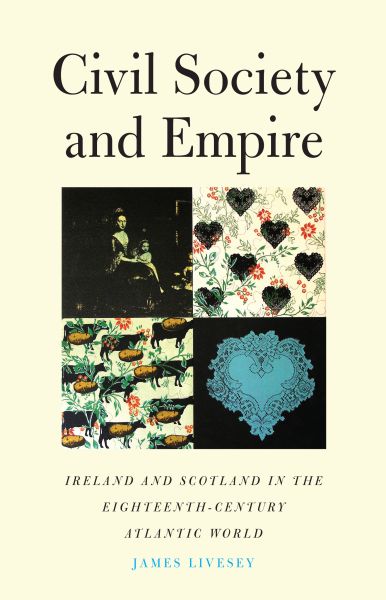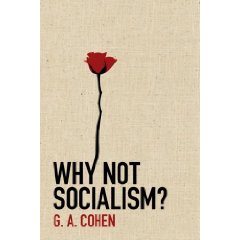 From Jim Livesey comes an interesting-looking book on the origins of civil society. If I were Tyler Cowen I would say it was self-recommending, but in fact Jim recommended it to me directly. (Although we’ve never met, Jim represents the vanguard of the Blackrock Road school of history, philosophy, social science, science, and public policy — an admittedly hazy entity constituted mostly by him and his brothers.) The concept of “civil society” was in the ascendancy after 1989 and was everywhere in the social sciences and political talk by the late 1990s. Livesey’s book argues that the idea has roots in the defeated provincial elites of Scotland and Ireland, as a way for them “to enjoy liberty without directly participating in the empire’s governance”. I could probably have done with reading this two weeks ago, before I kicked off my social theory seminar with a quick and cheery survey of the situation of social theory prior to the nineteenth century, the sort of thing that gives real historians heart failure.
From Jim Livesey comes an interesting-looking book on the origins of civil society. If I were Tyler Cowen I would say it was self-recommending, but in fact Jim recommended it to me directly. (Although we’ve never met, Jim represents the vanguard of the Blackrock Road school of history, philosophy, social science, science, and public policy — an admittedly hazy entity constituted mostly by him and his brothers.) The concept of “civil society” was in the ascendancy after 1989 and was everywhere in the social sciences and political talk by the late 1990s. Livesey’s book argues that the idea has roots in the defeated provincial elites of Scotland and Ireland, as a way for them “to enjoy liberty without directly participating in the empire’s governance”. I could probably have done with reading this two weeks ago, before I kicked off my social theory seminar with a quick and cheery survey of the situation of social theory prior to the nineteenth century, the sort of thing that gives real historians heart failure.
From the monthly archives:
September 2009
Reading the current US debate on health care from the outside is pretty dispiriting. It is an example of what happens to rational debate in circumstances of inequality where vested interests and partisan pundits can distort discussion by throwing loads of noise, fear and disinformation into the conversation. Still, that’s no reason not to try to have a conversation about which principles ought to obtain, and I think for that it is hard to beat Ronald Dworkin’s paper “Justice in the Distribution of Heath Care”, _McGill Law Journal_, 38 (1993), pp. 883-98 (though I’m looking at the reprint in Clayton and Williams eds _The Ideal of Equality_ ).
Dworkin’s “central idea”:
bq. … we should aim to make collective, social decisions about the quantity and distribution of health care so as to match, as closely as possible, the decisions that people in the community would make for themselves, one by one, in the appropriate circumstances, if they were looking from youth down the course of their lives and trying to decide what risks were worth running in return for not running other kinds of risks. (C&W, 209)
Megan McArdle replies to my post:
So I’m not sure that this conversation is likely to be productive, since at least one side of it has decided to substitute sarcasm for engagement. But let’s see if we can’t tone down the nastiness a little, and try to have a reasonable discussion.
I agree with the first sentence. And I agree with the second sentence. Moving right along. [click to continue…]
In any book on policy thinking, the easy bit (not all that easy!) is to write about what’s wrong with existing ideas, in my case the zombie ideas I’m writing about. The chapter plan for my book includes, in each chapter, a section on “What next”. As regards the Great Moderation, which was essentially an interpretative claim about the data, it’s not really clear what to include. I’m leaving the details of macroeconomic thinking and policy for another chapter and writing about how society should handle risk. Comments and criticism appreciated as always.
I’m in the process of setting up a site at wikidot.com where the whole draft will be presented in wiki format. But I’ve been travelling and haven’t managed to get it going yet.
[click to continue…]
The stupidest decision I made as an undergraduate was not to go to Jerry Cohen’s lectures on Marxism. The London colleges, despite being almost completely separate, pooled resources to give Philosophy lecture courses for 2nd and 3rd years. The lectures were held in tiny lecture rooms at Birkbeck – I seem to remember usually being there on Tuesday and Thursday mornings. The relevant term, Jerry’s lectures were on the same morning as the philosophy of language and philosophy of mind courses; I knew that I only had the concentration for 2, and, despite being, I presumed, some sort of Marxist (unaffiliated), I had no interest in political philosophy (not least because I believed some quite unsubtle version of Marx’s theory of history). (I’ll also admit that I responded somewhat to peer-pressure; my mate Adrian was not going to the Marxism lectures, and it was fun to have coffee with him instead). Like, as I later found out, Jerry, I had not come to study philosophy in order to learn about political ideas – I’d been politically active since I was 15 and had been exposed to all the political ideas that implied while I was in secondary school (taught History by a member of the CPB (M-L); indirectly recruited to the peace movement by a former CPGBer; worked with someone in the NCP, various SWPers; engaged in conspiratorial faction fights within the peace movement against various Trotskyists including CB’s flatmate of that time… you get the idea). I went to university to study something that I knew I couldn’t learn any other way – analytical philosophy. So it was easy to pass up Jerry’s lectures, even though everyone said they were brilliant, and even though I was interested in Marxism.
Later Jerry influenced me enormously. I bought Karl Marx’s Theory of History A Defence
as a celebration of getting my degree and read it first on a trip after graduating; I studied it about half-way through graduate school (along with these papers by Levine and Wright, and Levine and Sober), and more than anything else was responsible for my shift away from philosophy of language to political philosophy; because, like most readers of KMTH, I became convinced that the version of Marx’s theory of history that had seemed to me to make political philosophy irrelevant was false. I then read what is still my favourite Jerry paper, “The Structure of Proletarian Unfreedom”, and subsequently saw him lecture at UCLA; from then on I guess I read nearly everything he published, as soon as I could get my hands on it.

So now, what I presume is his final book, Why Not Socialism? (UK
) (I hope there’ll be other publications – presumably someone, probably one of our readers, is taking responsibility for seeing some of the work that Jerry left unpublished into print) is in my hands. Princeton have deliberately created it to be like On Bullshit
– very short, beautifully made, small enough to fit in a smallish pocket. People have been calling it the “camping trip” book; he uses the conceit of a camping trip to demonstrate that organizing social life around the two principles that, for him, define socialism – a very stringent version of equality of opportunity, and a very demanding principle of community – is very appealing to most people in some circumstances. He goes on to demonstrate that the appeal of these principles is not superficial, or restricted to unusual circumstances such as a camping trip, but are appealing at a society-wide level too: